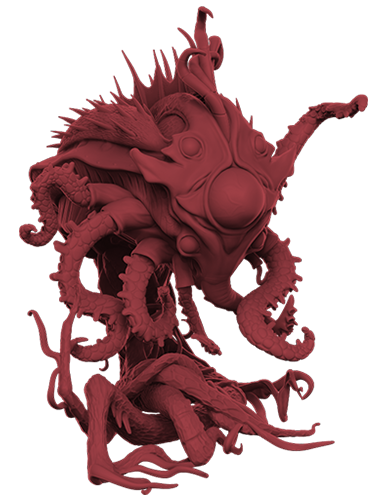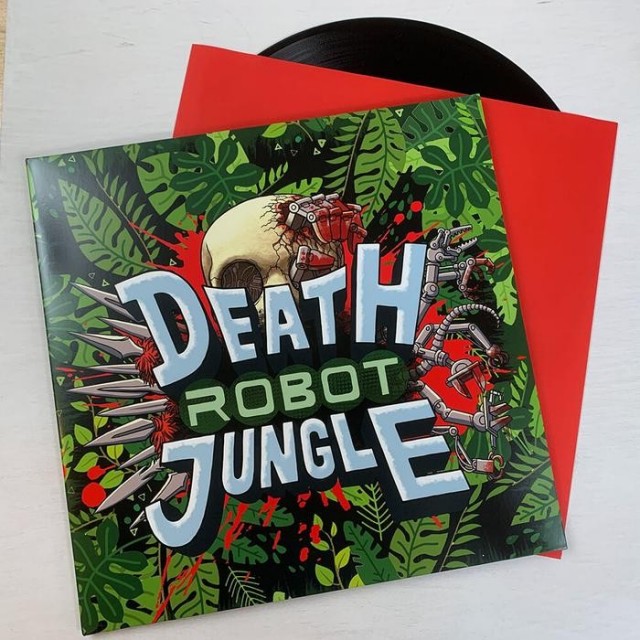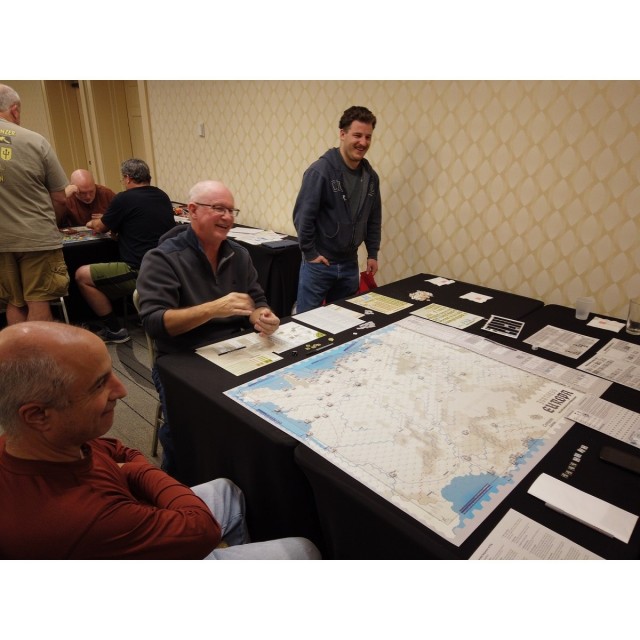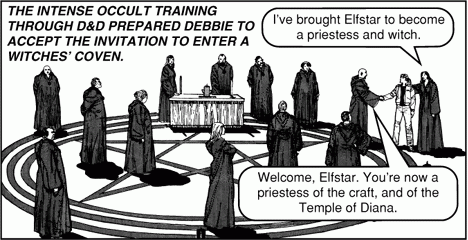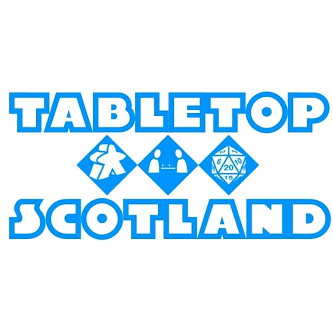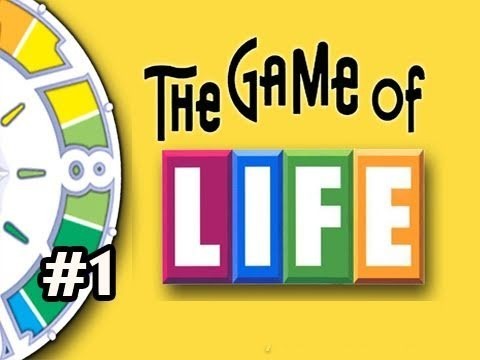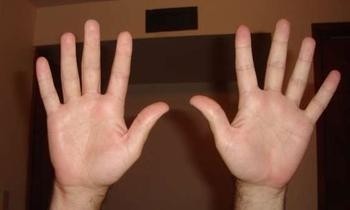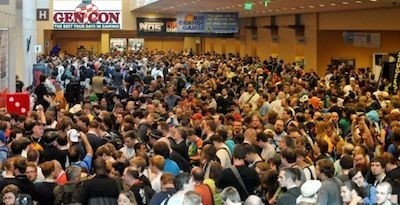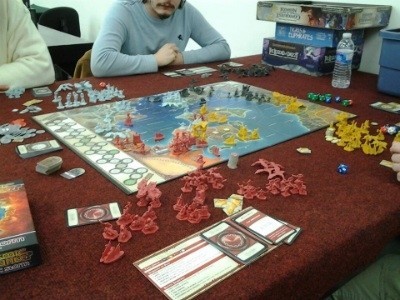
There's been a lot of talk lately about purchasing embargoes, about playing what we have, and about 'responsible' purchasing. There's also the current US economic mess to consider. So what's a gamer to do, when money's tight, shelf space is limited, and you're already drowning in a sea of games?
Trade, baby. It's all about trading.
I've always been hooked on trading. Even since my CCG days, where trading was rampant, I would often use an existing game I was playing as leverage to get into another one. Trading was always appealing because hey, you already have this stuff you're not using...so why not get a dose of something new?
No matter how we slice it, most of us can't always ignore the appeal of newer games. Sure, there are a ton of great games, fantastic classics that have already been released. But maybe the "World's Greatest Game" hasn't been released yet. Or maybe there's a theme, a game type that you're a whore for (mine are sports and adventure games.) Face facts--no matter how adamant we are, newer games will always play a part of our scene. You can look at the hits and comments on an article about an older game versus one that is the "new hotness." Clearly, people vote with their clickers.
Anyway, don't despair. I've made a fine time on the trade circuit and you can, too. I've done 70+ boardgame trades alone, not even counting the dozens upon dozens of other types I've done. In that time, I've picked up some pointers to share with you that might make your experience easier.
Deciding What You Want:
This is probably the easy part. Whether it's an ad you've seen on a website, or us babbling about some game we've played, or something you got to try at a friend's house, compiling a list of wanted games should be rather easy. But it *is* important to have a solid idea of what you're looking for.
That way, when a trader approaches you and asks, "What are you looking for?" you won't have to respond, "I don't know, what do ya have?"
Deciding What You Have to Offer:
Definitely the tougher part. And this feeds off the "Deciding What You Want" part...if you're looking for expensive games, or OOP titles, or big in-demand stuff, you'd better be willing to offer something decent in return.
It can be really hard to make that decision to part with something. I've found it way easier to do on paper than in actuality. If you've ever traded, there's probably been a moment where you tell yourself, "I'm going to trade off Game X." Then you get home, take out Game X to inventory it and you remember why you bought it in the first place.
Still, stick to your guns. Odds are if your concious mind was telling you to part with something, don't let the physical allure of the game cloud your mind.
A good rule of thumb--if you haven't played it or even touched it in a year's time, it might be time to let it go. Unless it's a game you absolutely know you're going to love once you get to play it again, and that's the hard part--to tell the difference.
The last point is to inventory those games you're offering. Yeah, you *think* it's complete, but it will suck later if you find out ten minutes of inspection would have revealed you were missing half a dozen minis.
Weeding Through What You Have to Offer: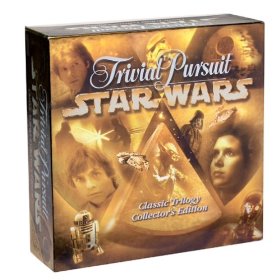
Odds are the first several games you added to your Trade pile were easy to do. Guess what? If you don't like 'em--don't want 'em--then odds are that not as many people are going to want them either.
Hey, sure, great, you've got Star Wars Monopoly and Guesstures, and you'd be keen to get rid of them. Sorry, we're not exactly looking for 'em either.
It's okay to keep them on the Trade Pile, but just don't expect much for them, if you ever even get a nibble. And if something is on the trade pile for over a year with nary a nibble, consider donating it to charity or a thrift store.
Speaking of which...
This Ain't Rags to Riches:
Everybody dreams of it--finding some holy grail of gaming for $2 and trading it for every game you've ever wanted. While that has and could possibly maybe remotely happen to you someday, odds are it isn't going to.
Thrifting is a dedicated art, and it carries with it a lot of work, and a high tolerance for disappointment.
The point of this is, be wary of random thrift grabs solely hoping to "trade up." Odds are someone listened to point #3 above and dumped 'em because they had no use for them.
This goes for all those damned Barnes and Nobles sales too. Everyone knows what that stuff costs, and while eventually it may reclaim its original value (Ra and DOOM come to mind), don't expect to turn around and unload your $10 stack of games for that much.
Okay, so you've decided what you want, what you have to offer, and refined your trade list. Now, dealing with other traders.
Approaching Other Traders:
Whether you're using Craigslist, our forums, Boardgamegeek, or a host of other trading websites, learning how to approach and deal with other traders is important.
I think the biggest thing is "lowballing" and will get you ignored as quickly as you can say, "Rondels are just manual Spinners." Yet people still manage to do it, day in and day out. Obviously they haven't read my article yet or they'd know better.
Yeah, you might find a sucker willing to offload their Dune for your League of Pirates. But ask yourself, "how would I feel if I found out later I'd just got taken to the cleaners?"
Be friendly. Be up front about what you're looking for, what you have, and what things are worth to you. If you lay that stuff out front, it will reduce a lot of the guessing game.
That brings me to--
Be the Kind of Trader You'd Like to Deal With:
Would you want to trade with someone who tossed ridiculous offers your way, didn't respond to messages, and tried to milk you for every penny you had? I mean, maybe you'll finish the one trade just to get that one game you really, really want, but you're going to steer clear of that person in the future.
Establishing good trader relationships is pretty important. It will cut down the work on future transactions, and the other party will 'loosen' up and not be such sticklers for precise value and might let a few things slide.
Get a reputation as a fair and friendly trader and it will make your life much, much easier. And keep those new games passing through your hands. This is very important.
Consider Shipping Concerns:
 There's no getting around the fact that the prices of shipping are going up and will continue to go up. If you're involved in a trade where the other party is going to have to ship something heavy, keep that in mind.
There's no getting around the fact that the prices of shipping are going up and will continue to go up. If you're involved in a trade where the other party is going to have to ship something heavy, keep that in mind.
I did a trade not long ago where I appeared to be giving up more in value, but the other guy was shipping out World of Warcraft, all its expansions, and a bunch of Star Wars minis. I knew his shipping was going to be much higher than mine--it turned out to be almost 3x as expensive, in fact.
He knew that I was 'cutting slack' in terms of compensating for his additional shipping concerns and was grateful for it. Not only did I establish a new trading partner, he even tossed in a couple of extra minis I didn't ask for as well as a Star Wars toy for my son. That's awesome.
Understand the "Rules of the Road":
Every forum has its rules, whether formal or informal, of how traders are expected to behave, and how trades are to be resolved. Once you and the other party are close to making the deal, be sure to make yourself aware of whatever those rules might be.
Lots of forums ask or require traders with little trade feedback to ship first. If this happens to you, don't be offended...they're just covering themselves. It's easy to sign up for a website and bilk people for a couple of games before slipping off into the night.
You being willing to ship first will alleviate those fears. Don't be insulted by that. Just make sure the person you're dealing with has some feedback of their own, so you know in turn that *you're* dealing with a reputable trader.
So you've cinched the deal. Now what?
Packaging:
This is a big deal for a lot of traders, myself included. Remember that the stuff you're sending is about to be handled, tossed, and kicked around by people who have no idea what's inside and generally don't give a shit either.
You wouldn't want a copy of Game of Thrones--advertised as "Like New"--to reach you and look like it had been chewed up by a dog, would you?
Be careful in your packaging. You want a box big enough that the stuff you're sending isn't flush with the sides of the box. This protects it from impact, like if the UPS guy gets pissed and decides to lay the boots to it or something. (You never know, those UPS guys look like they have some pent-up rage.)
You'll want to use plenty of bubble wrap or packing peanuts to add that extra bit of insulation.
Don't neglect the inside of the game, though! If it's got tons of little bits inside, bag 'em. Find a way to keep all the cards in place in their wells--I just wrap them in a napkin.
You do this, and you'll never get that sinking feeling when you send off your "pristine" game, and your receiver messages you that they got the game with a split corner and several cards caught in the box and creased. You've come this far in the trade, don't let 'em down now.
Shipping:
Be prompt in your shipping. Communicate to the other party when and how you'll be shipping your games. A great way to do this is to obtain a tracking number and give that to them, so they can see the package progress and plan accordingly. UPS is great for this because with your shipping price you get automatic $100 insurance and nearly real-time tracking, both of which are awesome.
Follow up when you see that it's arrived, or especially if it seems to have stalled. Make sure they get everything okay.
It's perfectly okay to ask for a tracking number in return when they ship, as you'll get all these same benefits.
So now it's time to finish the trade.
Inspection:
First things first--when you get the game you're receiving, be sure to look it over and expecially to take inventory of it. Most traders are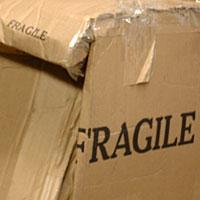 honest, but mistakes happen. If they've forgotten to put the game's custom dice in there, they need to know about it quickly so they're more likely to be able to find them.
honest, but mistakes happen. If they've forgotten to put the game's custom dice in there, they need to know about it quickly so they're more likely to be able to find them.
If there are damaged or missing parts, you'll have a choice to make. Some companies are fantastic about offering replacements, but some aren't, especially if you got the game second-hand. So you'll either need the other trader to make it right, or get replacements from the company if they'll offer them. If the game's OOP, the choice is harder as replacements probably won't be easy to come by. At that point, it will be up to you and the other trader to figure out how to proceed.
Likewise, expect your game to receive the same scrutinty. Mistakes happen, and even if you were careful with your inventory you may have missed something. If you advertised something as complete and it isn't, it will be up to you to make things right.
Feedback:
If the website you're using has a Feedback system, be sure to use it at the conclusion of the trade. If someone went the extra mile in a trade, make a note of it so other traders will know they're dealing with a great trader.
If a trade went sour--you get the game damaged with no remorse on their part, or there's stuff missing, or worst of all if they never ship--then also use feedback to convey that to other traders.
Trading is an awesome way of keeping your rotation of games fresh, of getting rid of stuff you don't play or don't like, and saving a bit of coin here or there. Free up your shelf space and sanity and get those games shifted into something you're more likely to enjoy. Everyone goes home happy, end of story.
 Games
Games How to resolve AdBlock issue?
How to resolve AdBlock issue? 

